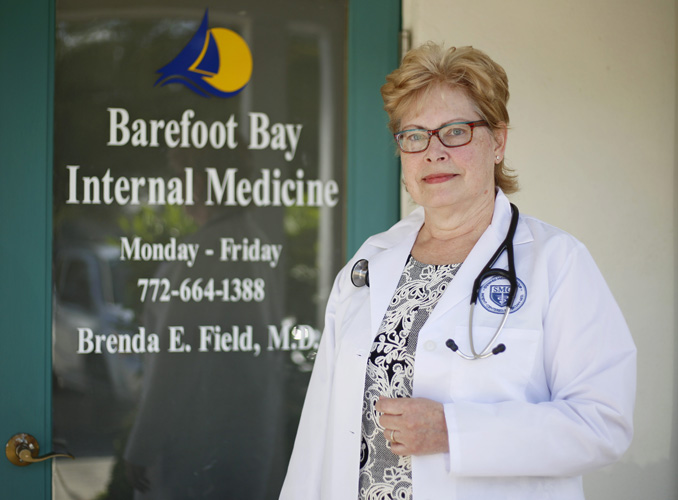
Looking for something quick and easy you can do to live longer, healthier and happier?
Dr. Brenda Field at Barefoot Bay Internal Medicine and the Steward Medical Group has a suggestion: Get yourself a clear, quart-sized plastic bag.
What does a plastic bag have to do with living a longer, healthier life?
It’s all about keeping track of all the medications, vitamins and over-the-counter supplements you are taking.
Most of us grew up thinking prescription medications are our friends.
“They reduce aches and pains, fight infections and help control problems such as high blood pressure or diabetes,” says the U.S. National Library of Medicine, but it then goes on to add those same medications can cause problems in the form of adverse drug reactions (or ADRs), which can be debilitating and even lethal.
Adverse reactions can be caused by the drug itself, the combination of one drug or supplement with another, or the length of time a drug has been taken.
It’s not unusual, according to Field, for some patients to have been taking the same medications for decades without thinking much about it, but our bodies – and how they metabolize those medications – do change as the years go by.
“The way we handle medications changes as we get older,” Fields says. “The way we break them down changes. The way we would break down and metabolize medications when we’re younger versus older is different.”
That’s where the clear plastic bag comes into play.
Field’s advice is to “bring all the pill bottles in” with you on your next visit to your doctor. “We are actually very happy when patients come in with all their medications and supplements. That is our best chance of trying to really figure out what they’re taking.
“It just makes sense to do a regular re-analysis and see if there’s still a good reason for taking everything you’re taking.
“Are the meds the right dose for your situation now?
“Are you seeing interactions that maybe you didn’t see before?”
The contents of that Ziploc bag gives Field the information she needs to spot a potential dosage or adverse interaction problem before it becomes something truly serious – including a doctor’s name and dosage instructions in the case of prescription pill bottles.
A list of medications and supplements could also be fine, this primary care physician admits – and easier to carry into the office – but only if it accurate and comprehensive.
“What makes me nervous is when I ask people for a medication list and they pull out a piece of paper from their wallet or their bag that’s been folded into a square this big,” Field says, using her hands to show a 1-to-2-inch square.
Those lists, she adds, have “obviously been in their wallet for 15 years so I do not have a lot of confidence in that kind of [medication] list.”
Field says she does have a few patients who keep relatively good lists, some providing Excel spreadsheets. But even those higher-tech lists need to be updated regularly and many patients tend to put that off. “Things get crossed out or added in,” Field notes, often without including the dates, dosages or the name of the prescribing physician.
In Field’s eyes, the first thing to try to establish is what her patients have actually been taking. Not just what’s on their list.
Bringing in the bottles helps Field do her job. And that includes those over-the-counter products.
“A lot of people don’t include supplements, and that’s pretty important,” Field says. “One of the biggest issues recently is cannabidiol or CBD oil [which is extracted from the flowers and buds of marijuana or hemp plants] and is available from your local health-food store.”
“I don’t have any particular philosophic issue with people using CBD oil,” Field explains, “but because of the way it’s being promoted, people have a feeling that it’s always OK.
“They’re kind of shocked when I tell them, ‘No. It can actually affect the metabolism of your regular drugs.’
“If you want to try CBD oil, we can talk about that. I’m not going to tell you, ‘Oh God, no’ but I need to know if you’re using it because it potentially affects your cholesterol medications” and other prescription drugs.
As the National Institutes of Health says, with more patients taking more drugs and more supplements, the risk of adverse drug reactions is rapidly increasing.
So, for the price of a clear plastic bag, you can ask your primary care physician to review all the prescription drugs and supplements you’re currently taking and ask his or her advice about whether there’s a potential problem that might stand in the way of that longer, healthier and happier life.
Dr. Brenda Field is at Barefoot Bay Internal Medicine at 8000 Ron Beatty Blvd., Suite A-3 in Barefoot Bay. The phone number is 772-664-1388.



